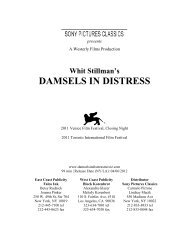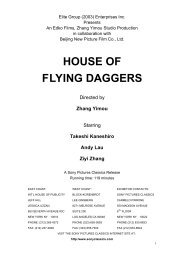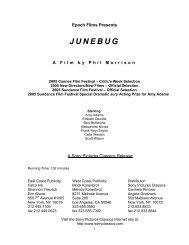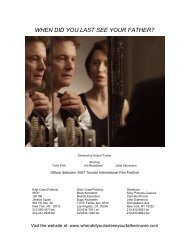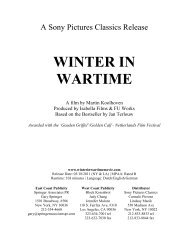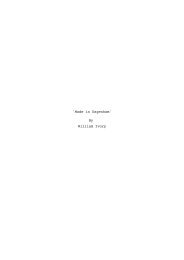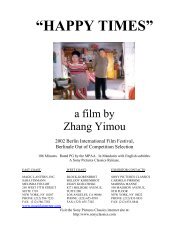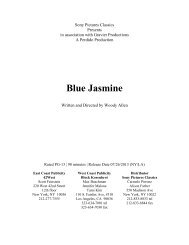Press Kit - Sony Pictures Classics
Press Kit - Sony Pictures Classics
Press Kit - Sony Pictures Classics
Create successful ePaper yourself
Turn your PDF publications into a flip-book with our unique Google optimized e-Paper software.
A <strong>Sony</strong> <strong>Pictures</strong> <strong>Classics</strong> Release<br />
Armada Films and Why Not Productions present<br />
OF GODS AND MEN<br />
A film by Xavier Beauvois<br />
Starring Lambert Wilson and Michael Lonsdale<br />
France's official selection for the 83rd Academy Award for<br />
Best Foreign Language Film<br />
2010 Official Selections:<br />
Toronto International Film Festival | Telluride Film Festival | New York Film Festival<br />
Nominee: 2010 European Film Award for Best Film<br />
Nominee: 2010 Carlo di Palma European Cinematographer, European Film Award<br />
Winner: Grand Prix; Ecumenical Jury Prize - 2010Cannes Film Festival<br />
Winner: Best Foreign Language Film, 2010 National Board of Review<br />
Winner: FIPRESCI Award for Best Foreign Language Film of the Year, 2011 Palm<br />
Springs International Film Festival<br />
www.ofgodsandmenmovie.com<br />
Release Date (NY/LA): 02/25/2011 | TRT: 120 min<br />
MPAA: Rated PG-13 | Language: French<br />
East Coast Publicist<br />
Sophie Gluck & Associates<br />
Sophie Gluck<br />
124 West 79th St.<br />
New York, NY 10024<br />
Phone (212) 595-2432<br />
Sophie@gluckpr.com<br />
West Coast Publicist<br />
Block-Korenbrot<br />
Ziggy Kozlowski<br />
Melody Korenbrot<br />
110 S. Fairfax Ave., Ste 310<br />
Los Angeles, CA 90036<br />
Phone (323) 634-7001<br />
Fax (323) 634-7030<br />
Distributor<br />
<strong>Sony</strong> <strong>Pictures</strong> <strong>Classics</strong><br />
Carmelo Pirrone<br />
Lindsay Macik<br />
550 Madison Avenue<br />
New York, NY 10022<br />
Phone (212) 833-8833<br />
Fax (212) 833-8844
SYNOPSIS<br />
Eight French Christian monks live in harmony with their Muslim brothers in a monastery<br />
perched in the mountains of North Africa in the 1990s. When a crew of foreign workers<br />
is massacred by an Islamic fundamentalist group, fear sweeps though the region. The<br />
army offers them protection, but the monks refuse. Should they leave? Despite the<br />
growing menace in their midst, they slowly realize that they have no choice but to stay…<br />
come what may. This film is loosely based on the life of the Cistercian monks of<br />
Tibhirine in Algeria, from 1993 until their kidnapping in 1996.<br />
PREAMBLE<br />
In 1996 the kidnapping and murder of the seven French monks of Tibhirine was one of<br />
the culminating points of the violence and atrocities in Algeria resulting from the<br />
confrontation between the government and extremist terrorist groups that wanted to<br />
overthrow it.<br />
The disappearance of the monks – caught in a vise between both sides- had a great and<br />
long-lasting effect on the governments, religious communities and international public<br />
opinion. The identity of the murderers and the exact circumstances of the monks’ deaths<br />
remain a mystery to this day.<br />
The case was taken up by a French court in 2003. Certain documents were recently<br />
declassified. In the upcoming months, new revelations may finally bring the truth to light.<br />
ABOUT THE FILM<br />
By screenwriter Etienne Comar<br />
OF GODS AND MEN is loosely based on the Tibhirine tragedy. It explores the last few<br />
months in the life of this small community of Christian monks in a “Muslim land.” The<br />
film is more interested in capturing the spirit of the events and what was at stake in the<br />
community than in recounting the exact details of a historic reality.<br />
The story begins several weeks before the terrorists issued an ultimatum ordering all<br />
foreigners to leave the country. An armed terrorist group even broke into the monastery<br />
on Christmas Eve.<br />
The monks’ dilemma, dormant until that point, is now clear: stay or leave? The decision<br />
must be made as a group. But for them, the choice of going or staying, despite the threats,<br />
is laden with consequences. When they refuse military protection, the government asks<br />
them to return to France.<br />
Each monk will make his decision by assessing the human, political and religious stakes<br />
and by plumbing the depths of his soul and conscience. This dramatic tension<br />
2
accompanies the practical and mystical daily life of the community: their deep ties to the<br />
villagers and the spirit of peace and charity with which they try to counter the violence<br />
eating away at the country.<br />
OF GODS AND MEN bears witness to the reality of the monks’ commitment and the<br />
strength of the message of peace they wish to share by staying among their Muslim<br />
brothers: the possibility of a fraternal and spiritual common ground between Christianity<br />
and Islam.<br />
The monks call the army “the brothers of the plain” and the terrorists “the brothers of the<br />
mountain.” Far from naïve, they were aware they were walking a fine line between two<br />
sides with ambiguous positions.<br />
Xavier Beauvois’ film adopts the point of view of the monks and the rhythm of life in a<br />
Cistercian monastery.<br />
Throughout Europe, OF GODS AND MEN is critically acclaimed and a huge box-office<br />
success in France.<br />
MONASTIC SONGS: CHOIR OF MEN, HEART OF GOD<br />
By Henry Quinson, monastic advisor<br />
Besides Tchaikovsky’s Swan Lake during the monks’ last supper, OF GODS AND MEN<br />
rests solely on the music of hymns and psalms.<br />
Songs were initially decisive during the shoot’s preparatory stage: initiated and directed<br />
in Paris by choir master François Polgar, the actors were progressively transformed by<br />
the words and the musical tonality of these songs. Above all, they started to become a<br />
community. During the press conference in Cannes, Lambert Wilson expressed it clearly:<br />
“Through songs that elevate and unite us, we became brothers”.<br />
The singing scenes also helped give rhythm to the story. They first allow us to see and<br />
hear the monastic community during its most frequent and regular activity: the seven<br />
daily offices, in other words, four hours of singing a day. “To chant psalms”, confides<br />
actor Olivier Rabourdin “is to breathe together, to share the Breath of Life”.<br />
Afterwards, the proposed repertory sticks to the brothers’ life and thus expresses their<br />
questions, their fears and their faith, as they relate directly to the increasingly serious<br />
events that are shaking the monastery and the region.<br />
The enemy persecutes my soul<br />
He has smitten my life to the ground<br />
3
He has made me dwell in darkness<br />
with those long dead<br />
My spirit grows faint within me<br />
My heart within me, dismayed (Psalm 142)<br />
Lastly, the monks’ choir is the heart of God. This chorus intervenes as it would in a<br />
Greek tragedy, as a theological and spiritual commentary of the action. The songs give<br />
God words, and God gives his Spirit of communion and peaceful resistance to the monks<br />
who are caught up in the turmoil of an increasingly menacing and problematic violence.<br />
To the worrisome drone of a helicopter whirring above the monastery, the community<br />
opposes a mystical and disarmed hope:<br />
The shadows, for you are not shadows<br />
For you, night is as clear as day.<br />
The military apparatus disappears, but the question lingers: should one stay or leave?<br />
The community meetings will not suffice. The answer lies in the word of God, listened<br />
to, meditated upon and celebrated:<br />
Save us, Lord, whilst we watch!<br />
Keep us, Lord, whilst we sleep!<br />
And we shall watch with Christ<br />
And we shall rest in peace…<br />
Under the audience’s gaze, the monks sing their life and live their singing--to the<br />
extreme:<br />
Because he is with us in this time of violence,<br />
let us not dream that he is everywhere<br />
other than where we die.<br />
Let us make haste.<br />
Kidnappers and monks disappear in the snow and the fog. They all take on the color of<br />
the liturgical clothes in which the brothers prayed and sang.<br />
In the heart of winter, the paradoxical victory of Light:<br />
We do not see your face,<br />
Infinite Love,<br />
but you do have eyes<br />
for you weep through the oppressed<br />
and look upon us<br />
with a shining gaze<br />
that reveals your forgiveness<br />
4
Interview with Lambert Wilson (Christian)<br />
“Music occupies an absolutely primordial place in my life. I think that I could have been<br />
a singer. In fact, it I had done a little work on myself before diving into theatrical studies,<br />
I think I would have most certainly extracted from myself this passion, which suits me<br />
better. I listen to vocal music very often, as well as to a lot of religious and liturgical<br />
music-- a lot of singing especially.<br />
Historically, since the time of the Greeks, singing - lyrical art - was always linked to the<br />
dramatic arts; unfortunately modern actors are no longer connected to singing. Today<br />
however, in theatre directing in particular, one speaks of rhythm, intonation, dynamics –-<br />
we are in fact using a lyrical vocabulary.<br />
I think music must be constantly integrated into an actor’s work. It is useful to me in my<br />
work, in order to prepare myself emotionally for certain scenes. Singing is organic, it is<br />
not intellectual-- it’s a feeling, an emotion, a physical action. It was singing that prepared<br />
us the most to perform these particular roles.<br />
During the shoot of another film, I began studying the scores we would be singing in OF<br />
GODS AND MEN. It was really during the classes with François Polgar that we began<br />
the real work, that the actors fused into a team and the community spirit began.<br />
The first interactions were a bit embarrassing because none of us were great singers, but<br />
it helped break the ice between us. As actors, it is because we had to work together on<br />
singing that it helped us become this community of monks. We had to fuse in some sort<br />
of higher level and reveal our own identities at the same time. For me, singing, besides<br />
the biographical work each of us did on our respective characters, is what constituted the<br />
essential foundation of our preparation. At the Tamié Abbey, where we went on a retreat,<br />
monks spend four hours a day singing during the seven religious offices. We all loved<br />
doing this work with multiple voices--it’s the principle of fusion in the choir. It was a<br />
very exhilarating journey.<br />
In fact, it reminded me of the very simple emotions I loved when I was little. I did a little<br />
choir singing in kindergarten, and I totally loved it. In fact, that is why I say I am a<br />
frustrated singer: I think there is no more beautiful activity than singing.<br />
What is surprising with the actors is that they gave themselves to this singular exercise<br />
with a lot of candor. On the set, when we were waiting for the lights to be adjusted, for<br />
example, instead of idling time away, we sang together. Suddenly, we would start<br />
singing a “Salve Regina” or another tune because we took real pleasure in it. We felt a<br />
real sense of sharing among us-- it’s a very simple joy, almost playful, to start off from<br />
the same bar and to manage to reach the last one together”.<br />
5
Interview with Choir Master François Polgar<br />
I was contacted by the production team with a challenge which immediately enthralled<br />
me: out of a concern to seek truth and realism, they wanted to have the songs of the<br />
monastic community performed by the film’s own actors instead of using a CD or a<br />
soundtrack. The goal was to bring the viewers closer to the monks’ real life, and not to<br />
seek perfection in their singing. Besides Lambert Wilson, the actors had little or no<br />
previous experience with singing. So we set out to work intensely during two months<br />
with the help of the selected song scores and soundtracks they would play in a loop (in<br />
the street, in the subway, at the hairdresser’s…. Thanks to frequent and intense<br />
rehearsals, the program’s thirteen took form little by little. The actors were able to create<br />
and overcome the difficulty of certain songs, like the great Cistercian “Salve Regina” or<br />
the hymn “O Father of Light”. I recall their training with great admiration: the<br />
seriousness, the professionalism, the rigor and the determination of these actors, although<br />
non-singers, I found to be truly admirable.<br />
The second thing which struck me, and even more so during the shoot in Morocco, was to<br />
witness, once more, the federating power of music, and above all of song: at the<br />
beginning, no particular connection other than the love of their job as actors seemed to<br />
unite these professionals. At the end of the shoot, I found their metamorphosis was<br />
deeply moving; a group of actors had become a real community of men, obviously not a<br />
monastic community, but one with a mysterious homogeneity nonetheless.<br />
Letter by Brother Luc<br />
I was recently reading this “pensée” of Pascal's: "Men never do evil so completely and<br />
cheerfully as when they do it for religious conviction." Here there is confusion and<br />
violence.<br />
We are in a “risky” situation but we persist in our faith and our confidence in God. It is<br />
through poverty, failure and death that we advance towards him.<br />
Heavy and devastating downpours have not curbed the violence that is infiltrating itself<br />
everywhere. Two opponents are present, one wants to hold on to power, the other seize it.<br />
They are fighting with their backs against the wall. I don't know when or how it will all<br />
end. In the meantime, I perform my duty...<br />
Caring for the poor and the sick, awaiting for the day or the time to close my eyes. My<br />
dear friend, pray for me, may my exit from this world be done in the peace and joy of<br />
Jesus.<br />
6
Brother Christian’s testament<br />
Should it ever befall me, and it could happen today, to fall victim to the terrorism which<br />
seems to now want to engulf all the foreigners living here, I would like my community,<br />
my church and my family to remember that my life was GIVEN to God and to this<br />
country.<br />
May they accept that the Unique Master of all life could not be a stranger to this brutal<br />
departure. May they be able to associate this death to so many other violent ones,<br />
consigned to the apathy of anonymity.<br />
I've lived long enough to know that I am complicit in the evil that, alas, seems to prevail<br />
over the world and even of the one that would strike me blindly.<br />
I could never desire such a death. In fact, I don’t see how I could ever rejoice in this<br />
people I love being indistinctly accused of my murder.<br />
I know the contempt the people of this country may have indiscriminately been<br />
surrounded by. And I know which caricatures of Islam a certain Islamism encourages.<br />
This country and Islam, for me, are something else. They are a body and a soul.<br />
My death will of course quickly vindicate those who hastily called me naïve or idealistic,<br />
but they must know that I will finally be freed of my most burning curiosity and will be<br />
able, God willing, to immerse my gaze into the Father's in order to contemplate with him<br />
his children of Islam as he sees them.<br />
In this THANK YOU, where from now on all is said about my life, I include you of<br />
course, friends of yesterday and today, and you as well, friend of the last minute, who<br />
knew not what you were doing.<br />
Yes, for you as well I want this THANK YOU and this FAREWELL which you<br />
envisaged.<br />
And may we meet again, happy thieves in paradise, if it pleases God, the Father of us<br />
both.<br />
AMEN! INCH’ALLAH!<br />
7
MONASTIC LIFE<br />
Cistercian-Trappists life takes as its source the Bible, the Rule of Saint Benedict (written<br />
in the 7 th century) and the writings of the fathers of monasticism.<br />
It employs traditional forms of monastic prayer. The “liturgy of the hours” is group<br />
prayer largely based on the Psalms and performed in a chapel, seven times a day. Song<br />
forms an essential part of the prayer and the rhythm of Cistercian life. The monks sing<br />
with one voice to enter into communion with the Breath of Life. In unison, they blend<br />
together as one in spiritual combat.<br />
Cistercian monks prefer silence, which is the rule, during most of the day. But their life is<br />
so built around the teaching of the superior (abbot or prior) and group exchanges known<br />
as “chapters.” All major decisions are made in their chapterhouse. Always voted on, they<br />
are prefaced by one-to-one discussions in the superior’s office.<br />
The Cistercian-Trappists have no apostolic mission of evangelization and refrain from all<br />
proselytism.<br />
The Rule of Saint Benedict calls upon monks to practice hospitality and sharing,<br />
“especially with the poor and foreigners” and those who are suffering. It privileges<br />
manual labor and the fostering of relationships with neighbors through farming – vital<br />
during periods of insecurity and restriction.<br />
Monasteries are usually isolated from populated areas to favor a contemplative lifestyle<br />
amidst nature. Every Trappist monk sets aside one day a month to walk in nature and<br />
meditate alone.<br />
Today the Cistercian Order of Strict Observance numbers 2,600 monks and 1,883 nuns,<br />
in 96 monasteries and 66 convents the world over.<br />
IMPORTANT DATES<br />
DECEMBER 26, 1991<br />
The Front Islamique du Salut (FIS) wins the first round of legislative elections in Algeria.<br />
JANUARY 11, 1992<br />
A state of emergency is declared.<br />
JANUARY 14, 1992<br />
President Mohamed Boudiaf is assassinated.<br />
OCTOBER 30, 1993<br />
The Groupe Islamiste Armée (GIA) issues an ultimatum ordering all foreigners to leave<br />
the country.<br />
8
MARCH 26, 1996<br />
An armed group kidnaps the seven monks of Tibhirine: the prior Christian de Chergé<br />
(59); fathers Christophe Lebreton (45), Celestin Ringeard (62), Bruno Lemarchand (66);<br />
brothers Luc Dochier (82), Paul Favre-Miville (57) and Michael Fleury (52).<br />
APRIL 18, 1996<br />
The GIA claims responsibility for the kidnapping.<br />
MAY 21 and 23, 1996<br />
The GIA announces the murder of the seven monks after negotiations between the French<br />
and Algerian governments yield nothing.<br />
MAY 30, 1996<br />
The heads of the seven monks are found on a road near Médéa.<br />
SEPTEMBER 22, 1997<br />
The massacre of the villagers of Bentalha revives suspicions about the role of the military<br />
in kidnappings and murders in Algeria.<br />
1998 ONWARDS<br />
Decrease in violence and instability in Algeria. Beginning of a policy of national<br />
reconciliation.<br />
DECEMBER 9, 2003<br />
A judicial review in France is requested by the family of one of the monks and an abbot<br />
of the Cistercian order, questioning the truth of the official version given by the Algerian<br />
government.<br />
SEPTEMBER 29, 2005<br />
A referendum endorses the charter of “national reconciliation” proposed by President<br />
Bouteflika, granting conditional amnesty to the members of the armed groups in the<br />
1990s and outlawing any debate on that period of Algerian history.<br />
NOVEMBER 20, 2009<br />
Declassification of certain French documents, after the former French Defense Attaché in<br />
Algiers affirms that the seven monks were the victims of a mistake make by the Algerian<br />
army.<br />
References:<br />
"The Monks of Tibhirine" by John W. Kiser (St Martin <strong>Press</strong>)<br />
Web site: http://themonksoftibhirine.net/<br />
9
ABOUT WRITER-DIRECTOR XAVIER BEAUVOIS<br />
43 year-old writer-director Xavier Beauvois was raised in a working class family in the<br />
North of France. He started his film career as an assistant director on André Téchiné’s<br />
Les Innocents and Manoel de Oliveira’s Mon cas. He made his first short, Le Matou, in<br />
1986 and went on to write and direct his first feature Nord in 1991, which he also starred<br />
in. Set in the northern region of France, Nord chronicled the life of a dysfunctional family<br />
and earned Beauvois two Césars (France’s equivalent of the Academy Awards) for Best<br />
First Film and Most Promising Actor.<br />
During his stay at the Villa Medicis, the French Ministry of Culture’s prestigious artist<br />
residence in Rome, Beauvois directed his second feature, Don’t Forget You’re Going to<br />
Die, about a student who learns that he is HIV positive. Selected for the 1995 Cannes<br />
International Film Festival, it won the Jury Prize, and was later awarded the coveted Jean<br />
Vigo Prize, given by French Film Critics for Best French Film.<br />
In addition to his directing career, Xavier Beauvois has acted in numerous films by<br />
French luminaries such as Michel Deville, Jacques Doillon, Benoit Jacquot and Philippe<br />
Garrel. In 2001 he directed Selon Matthieu starring Benoit Magimel and Nathalie Baye.<br />
He cast the latter in Le Petit Lieutenant, his 2005 police drama, which earned him three<br />
César nominations for Best Film, Best Director and Best Original screenplay.<br />
FILMOGRAPHY AS WRITER/DIRECTOR<br />
2010 OF GODS AND MEN (DES HOMMES ET DES DIEUX)<br />
2005 THE YOUNG LIEUTENANT (LE PETIT LIEUTENANT)<br />
Official Selection, Venice Film Festival<br />
2000 ACCORDING TO MATHIEU (SELON MATHIEU)<br />
Official Selection, Venice Film Festival<br />
1995 DON’T FORGET YOU’RE GOING TO DIE (N’OUBLIE PAS QUE TU VAS<br />
MOURIR)<br />
Priz Jean Vigo<br />
Jury Prize, Cannes International Film Festival<br />
1992 NORTH (NORD)<br />
SELECTED FILMOGRAPHY AS ACTOR<br />
2009 THE CHAMELEON (LE CAMÉLÉON) by Jean-Paul Salomé<br />
VILLA AMALIA by Benoît Jacquot<br />
2007 THE WITNESSES (LES TÉMOINS) by André Téchiné<br />
2005 THE YOUNG LIEUTENANT (LE PETIT LIEUTENANT) by Xavier Beauvois<br />
1999 NIGHT WING (LE VENT DE LA NUIT) by Philippe Garrel<br />
1998 DISPARUS by Gilles Bourdos<br />
1997 LE JOUR ET LA NUIT by Bernard-Henry Lévy<br />
1996 PONETTE by Jacques Doillon<br />
10
1995 DON’T FORGET YOU’RE GOING TO DIE (N’OUBLIE PAS QUE TU VAS<br />
MOURIR) by Xavier Beauvois<br />
1994 AUX PETITS BONHEURS by Michel Deville<br />
1994 LES AMOUREUX by Catherine Corsini<br />
1991 NORTH (NORD) by Xavier Beauvois<br />
ABOUT DIRECTOR OF PHOTOGRAPHY CAROLINE CHAMPETIER<br />
After graduating in 1976 from the directing and cinematography program at the FEMIS,<br />
France’s acclaimed film school, Caroline Champetier joined cinematographer’s William<br />
Lubtchansky's team and worked for nine years on films by such French luminaries as<br />
Jacques Rivette, Claude Lanzmann, François Truffaut, Jean-Marie Straub, and Danièle<br />
Huillet. Her first feature film as director of photography was Chantal Akerman’s 1981<br />
Toute Une Nuit.<br />
"I'm looking for someone who knows a bit but not too much" is what Jean-Luc Godard<br />
said when he was looking for a cinematographer to shoot his 1985 Soigne ta Droite. That<br />
film jump-started Ms. Champetier’s career as one of France’s most acclaimed<br />
cinematographers and marked the beginning of her long collaboration with Godard. She<br />
worked on Greatness and Decline of a Little Movie Business (1986), Power of Word<br />
(1986), King Lear (1987), History of Cinema (1988), Hélas pour moi (1992), and<br />
Children Play Russia (1993).<br />
Ms. Champetier has alaos worked with Jacques Doillon, Philippe Garrel, Benoît Jacquot,<br />
André Techiné, Jacques Rivette, and Barbet Schroeder. She shot Sobibor... by great<br />
documentary director Claude Lanzmann in 2001. Her work with the new generation of<br />
French directors includes films by Arnaud Desplechin, Laetitia Masson and Xavier<br />
Beauvois. For the latter she shot Don't Forget You're Going To Die (1995), The Young<br />
Lieutenant (2005) and OF GODS AND MEN (2010). She also shot the "Merde" segment<br />
by Leos Carax for the collaborative film Tokyo (2008). Ms. Champetier has worked with<br />
Japanese directors Nobuhiro Suwa and Naomi Kawase along with Israeli director Amos<br />
Gitai.<br />
Besides her cinematography activities, Ms. Champetier teaches at the FEMIS, has written<br />
for the French publication "Cahiers du Cinema" and hosted a film show on France’s<br />
national public radio station, France Culture.<br />
LAMBERT WILSON (Christian)<br />
CAST BIOGRAPHIES<br />
Born in Paris, French actor Lambert Wilson studied theatre in London at the Drama<br />
Centre.<br />
11
Fred Zinnemann gave him his first leading screen role opposite Sean Connery in Five<br />
Days One Summer. He went on to act in more than fifty films with such European<br />
luminaries as Claude Chabrol, Luigi Comencini, Andrzej Wajda, Peter Greenaway,<br />
Carlos Saura, André Téchiné, Alain Resnais, Jacques Doillon, James Ivory, John Duigan<br />
and Deborah Warner.<br />
More recently, Lambert played the Merovingian in Matrix Reloaded and the Matrix<br />
Revolutions by the Wachowsky brothers. He worked with Richard Donner (Timeline),<br />
Pitof (Catwoman), Breck Eisner (Sahara), Michael Radford (Flawless), Marc Caro<br />
(Dante 01), Mathieu Kassowitz (Babylon A.D.), John Glenn (The Lazarus Project), and<br />
Vincent Garenq (Baby Love).<br />
Besides his starring role in OF GODS AND MEN, Lambert Wilson is the lead in<br />
Bertrand Tavernier’s new film, The Princess of Montpensier.<br />
On stage, Lambert has performed with some of the best European directors and<br />
playwrights including Jean-Louis Barreault, Antoine Vitez and Harold Pinter. He has<br />
acted in numerous plays in Paris and London, including Cocteau’s “The Infernal<br />
Machine,” with Maggie Smith, “A Little Night Music,” with Dame Judi Dench at the<br />
National Theatre, and “Ashes to Ashes,” directed by Harold Pinter. He recently played<br />
the part of Fredrick in a new production of “A Little Night Music” with Greta Schacchi<br />
and Leslie Caron at Paris’ Théâtre du Chatelet. Lambert has also directed several plays,<br />
including Racine’s “Bérenice” with Kristin Scott-Thomas at the Avignon Festival in<br />
2001, and again in 2008 with Carole Bouquet at Peter Brook’s Théatre des Bouffes du<br />
Nord. He directed Fanny Ardant in “Music-Hall,” by Jean-Luc Lagarce in 2009 and<br />
Marivaux’s “La Fausse Suivante,” at the Théâtre des Bouffes du Nord in 2010.<br />
Lambert has produced and performed as a singer in three musical one-man shows:<br />
“Lambert Wilson Chante” (1990), “Démons et Merveilles” (1997) and “Nuit<br />
Américaine” (2004), a tribute to modern American composers. He has recently played the<br />
roles of Pangloss, Voltaire and Martin in Bernstein’s “Candide,” directed by Robert<br />
Carsen at Paris’ Théatre du Châtelet and Milan’s Teatro Alla Scala (2007).<br />
Lambert has recorded several albums as a singer, including EMI’s “Musicals” (2004),<br />
and Virgin <strong>Classics</strong>’ “Loin” (2007).<br />
LAMBERT WILSON (Christian) – SELECTED FILMOGRAPHY<br />
2010 OF GODS AND MEN by Xavier Beauvois<br />
2010 THE PRINCESS OF MONTPENSIER by Bertrand Tavernier<br />
2009 VICTOR by Thomas Gilou<br />
2008 BABYLON A.D. by Mathieu Kassovitz<br />
2008 THE GREAT ALIBI by Pascal Bonitzer<br />
2008 DANTE 01 by Marc Caro<br />
2007 FLAWLESS by Michael Radford<br />
2006 PRIVATE FEARS IN PUBLIC SPACES by Alain Resnais<br />
12
2005 L’ANNIVERSAIRE by Diane Kurys<br />
2005 PALAIS ROYAL! By Valérie Lemercier<br />
2005 SAHARA by Breck Eisner<br />
2004 CATWOMAN by Pitof<br />
2003 THE MATRIX REVOLUTIONS by The Wachowski Brothers<br />
2003 THE MATRIX RELOADED by The Wachowski Brothers<br />
2003 NOT ON THE LIPS (PAS SUR LA BOUCHE) by Alain Resnais<br />
2003 IT’S EASIER FOR A CAMEL by Valeria Bruni Tedeschi<br />
2000 COMBAT D’AMOUR EN SONGE by Raoul Ruiz<br />
2000 JET SET by Fabien Onteniente<br />
1999 THE LAST SEPTEMBER by Deborah Warner<br />
1998 TROP (PEU) D’AMOUR by Jacques Doillon<br />
1997 SAME OLD SONG by Alain Resnais<br />
1997 MARQUISE by Véra Belmont<br />
1994 JEFFERSON IN PARIS by James Ivory<br />
1993 L’INSTINCT DE L’ANGE by Richard Dembo<br />
1989 HIVER 54, L’ABBE PIERRE by Denis Amar<br />
1989 LA VOUIVRE by Georges Wilson<br />
1988 EL DORADO by Carlos Saura<br />
1988 LES POSSEDES by Andrzej Wajda<br />
1987 THE BELLY OF AN ARCHITECT by Peter Greenaway<br />
1986 CORPS ET BIENS by Benoît Jacquot<br />
1986 BLEU COMME L’ENFER by Yves Boisset<br />
1985 RED KISS by Véra Belmont<br />
1985 L’HOMME AUX YEUX D’ARGENT by Pierre Granier-Deferre<br />
1985 RENDEZ-VOUS by André Téchiné<br />
1984 THE PUBLIC WOMAN by Andrzej Zulawski<br />
1984 THE BLOOD OF OTHERS by Claude Chabrol<br />
1982 FIVE DAYS ONE SUMMER by Fred Zinnemann<br />
1977 JULIA by Fred Zinnemann<br />
MICHAEL LONSDALE (Luc) – SELECTED FILMOGRAPHY<br />
2010 OF GODS AND MEN by Xavier Beauvois<br />
2009 AGORA by Alejandro Amenabar<br />
2007 PARK BENCHES (BANCS PUBLICS) by Bruno Podalydès<br />
2006 THE LAST MISTRESS (UNE VIEILLE MAITRESSE) by Catherine Breillat<br />
2006 HEARTBEAT DETECTOR (LA QUESTION HUMAINE) by Nicolas Klotz<br />
2006 GOYA’S GHOSTS by Milos Forman<br />
2005 MUNICH by Steven Spielberg<br />
2004 LE PARFUM DE LA DAME EN NOIR by Bruno Podalydès<br />
2003 5 X 2 by François Ozon<br />
2003 LE FURET by Jean-Pierre Mocky<br />
1999 ACTORS (LES ACTEURS) by Bertrand Blier<br />
1998 RONIN by John Frankenheimer<br />
13
1998 DON JUAN by Jacques Weber<br />
1994 NELLY & MONSIEUR ARNAUD (NELLY ET MONSIEUR ARNAUD) by<br />
Claude Sautet<br />
1994 JEFFERSON IN PARIS by James Ivory<br />
1992 THE REMAINS OF THE DAY by James Ivory<br />
1991 MY LIFE IS HELL (MA VIE EST UN ENFER) by Josiane Balasko<br />
1986 THE NAME OF THE ROSE (LE NOM DE LA ROSE) by Jean-Jacques Annaud<br />
1985 THE HOLCROFT COVENANT by John Frankenheimer<br />
1985 THE INSOMNIAC ON THE BRIDGE (L’EVEILLE DU PONT DE L’ALMA)<br />
by Raoul Ruiz<br />
1984 GOOD KING DAGOBERT (LE BON ROI D’AGOBERT) by Dino Risi<br />
1983 UNE JEUNESSE by Moshé Mizrahi<br />
1979 THE PASSAGE by J. Lee Thompson<br />
1978 DIE LINKSHÄNDIGE FRAU by Peter Handke<br />
1977 THE ACCUSER (L’IMPRECATEUR) by Jean-Louis Bertucelli<br />
1977 A DIRTY STORY (UNE SALE HISTOIRE) by Jean Eustache<br />
1976 MR. KLEIN (MONSIEUR KLEIN) by Joseph Losey<br />
1975 LE TELEPHONE ROSE by Édouard Molinaro<br />
1975 GALILEO by Joseph Losey<br />
1975 THE ROMANTIC ENGLISHWOMAN (UNE ANGLAISE ROMANTIQUE) by<br />
Joseph Losey<br />
1975 SECTION SPECIALE by Costa-Gavras<br />
1975 INDIA SONG by Marguerite Duras<br />
1974 THE PHANTOM OF LIBERTY (LE FANTOME DE LA LIBERTE) by Luis<br />
Buñuel<br />
1973 NO POCKETS IN A SHROUD (UN LINCEUL N’A PAS DE POCHE) by Jean-<br />
Pierre Mocky<br />
1973 STAVISKY by Alain Resnais<br />
1973 SUCCESSIVE SLIDINGS OF PLEASURE (GLISSEMENTS PROGRESSIFS<br />
DU PLAISIR) by Alain Robbe-Grillet<br />
1973 LA CHOISIE by Gérard Mordillat<br />
1973 NAISSANCE ET MONT DE PROMETHEE by Jacques Rivette<br />
1972 THE DAY OF THE JACKAL by Fred Zinnemann<br />
1971 CHUT! by Jean-Pierre Mocky<br />
1971 JAUNE LE SOLEIL by Marguerite Duras<br />
1970 OUT 1: SPECTRE by Jacques Rivette<br />
1970 OUT 1: NOLI ME TANGERE by Jacques Rivette<br />
1970 MURMUR OF THE HEART (LE SOUFFLE AU COEUR) by Louis Malle<br />
1970 LAW BREAKERS (LES ASSASSINS DE L’ORDRE) by Marcel Carné<br />
1970 PAPA THE LITTLE BOATS (PAPA, LES PETITS BATEAUX) by Nelly<br />
Kaplan<br />
1969 THE STUD (L’ETALON) by Jean-Pierre Mocky<br />
1969 DETRUIRE DIT-ELLE by Marguerite Duras<br />
1968 THE BIG WASH (LA GRANDE LESSIVE) by Jean-Pierre Mocky<br />
1968 STOLEN KISSES (BAISERS VOLES) by François Truffaut<br />
14
1967 THE BRIDE WORE BLACK (LA MARIEE ETAIT EN NOIR) by François<br />
Truffaut<br />
1966 IS PARIS BURNING? (PARIS BRULE-T-IL?) by Réne Clément<br />
1964 LES COPAINS by Yves Robert<br />
1964 BEHOLD A PALE HORSE by Fred Zinnemann<br />
1962 THE TRIAL (LE PROCES) by Orson Welles<br />
1962 ADORABLE MENTEUSE by Michel Deville<br />
1960 THE ITCHY PALM (LA MAIN CHAUDE) by Gérard Oury<br />
1958 A BULLET IN THE GUN BARREL (UNE BALLE DANS LE CANON) by<br />
Michel Deville<br />
CAST<br />
Christian<br />
Luc<br />
Christophe<br />
Célestin<br />
Amédée<br />
Jean-Pierre<br />
Michel<br />
Paul<br />
Nouredine<br />
Rabbia<br />
Omar<br />
Bruno<br />
Ali Fayattia<br />
Terrorist<br />
LAMBERT WILSON<br />
MICHAEL LONSDALE<br />
OLIVIER RABOURDIN<br />
PHILIPPE LAUDENBACH<br />
JACQUES HERLIN<br />
LOÏC PICHON<br />
XAVIER MALY<br />
JEAN-MARIE FRIN<br />
ABDELHAFID METALSI<br />
SABRINA OUAZANI<br />
ABDALLAH MOUNDY<br />
OLIVIER PERRIER<br />
FARID LARBI<br />
ADEL BENCHERIF<br />
A Why Not Production – Armada Films – France 3 Cinéma Coproduction<br />
With the participation of<br />
France Télévisions – Canal+ – Cinécinéma<br />
Centre National du Cinéma et de l’Image Animée<br />
in association with<br />
Cofinova 6 – Soficinéma 6 - Cinémage 4<br />
15
CREW<br />
Directed by<br />
Screenplay<br />
Adaptation and dialogues by<br />
Director of Photography<br />
Production Designer<br />
Sound<br />
Editor<br />
First Assistant Director<br />
Monastic Advisor<br />
Continuity<br />
Costume Designer<br />
Unit Managers<br />
Line Producers<br />
XAVIER BEAUVOIS<br />
ETIENNE COMAR<br />
XAVIER BEAUVOIS<br />
ETIENNE COMAR<br />
CAROLINE CHAMPETIER (A.F.C.)<br />
MICHEL BARTHELEMY (A.D.C)<br />
JEAN-JACQUES FERRAN<br />
ERIC BONNARD<br />
MARIE-JULIE MAILLE<br />
GUILLAUME BONNIER<br />
HENRY QUINSON<br />
AGATHE GRAU<br />
MARIELLE ROBAUT<br />
THIBAULT MATTEI<br />
KHALED HAFFAD<br />
FRANTZ RICHARD<br />
MARTINE CASSINELLI<br />
16



